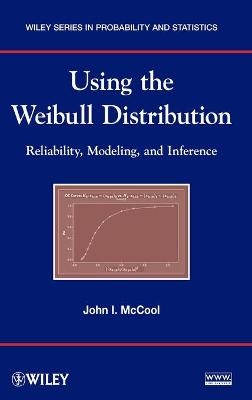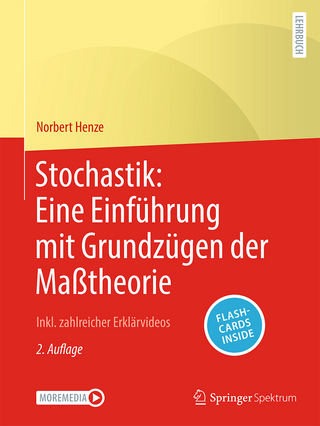
Using the Weibull Distribution
John Wiley & Sons Inc (Verlag)
978-1-118-21798-6 (ISBN)
Understand and utilize the latest developments in Weibull inferential methods
While the Weibull distribution is widely used in science and engineering, most engineers do not have the necessary statistical training to implement the methodology effectively. Using the Weibull Distribution: Reliability, Modeling, and Inference fills a gap in the current literature on the topic, introducing a self-contained presentation of the probabilistic basis for the methodology while providing powerful techniques for extracting information from data.
The author explains the use of the Weibull distribution and its statistical and probabilistic basis, providing a wealth of material that is not available in the current literature. The book begins by outlining the fundamental probability and statistical concepts that serve as a foundation for subsequent topics of coverage, including:
• Optimum burn-in, age and block replacement, warranties
and renewal theory
• Exact inference in Weibull regression
• Goodness of fit testing and distinguishing the Weibull
from the lognormal
• Inference for the Three Parameter Weibull
Throughout the book, a wealth of real-world examples showcases the discussed topics and each chapter concludes with a set of exercises, allowing readers to test their understanding of the presented material. In addition, a related website features the author's own software for implementing the discussed analyses along with a set of modules written in Mathcad®, and additional graphical interface software for performing simulations.
With its numerous hands-on examples, exercises, and software applications, Using the Weibull Distribution is an excellent book for courses on quality control and reliability engineering at the upper-undergraduate and graduate levels. The book also serves as a valuable reference for engineers, scientists, and business analysts who gather and interpret data that follows the Weibull distribution
JOHN I. McCOOL, PhD, is Professor of Systems Engineering at Penn State Great Valley School of Graduate Professional Studies. A Fellow of the American Society for Quality, Dr. McCool previously served as principal engineering scientist at SKF Industries Inc., where he conducted corporate as well as federally sponsored research projects with the Wright-Patterson Air Force Base, the Office of Naval Research, the Naval Air Propulsion Center, the Department of Energy, and the Air Force Office of Scientific Research.
Preface xiii
1. Probability 1
1.1 Sample Spaces and Events 2
1.2 Mutually Exclusive Events 2
1.3 Venn Diagrams 3
1.4 Unions of Events and Joint Probability 4
1.5 Conditional Probability 6
1.6 Independence 8
1.7 Partitions and the Law of Total Probability 9
1.8 Reliability 12
1.9 Series Systems 12
1.10 Parallel Systems 13
1.11 Complex Systems 15
1.12 Crosslinked Systems 16
1.13 Reliability Importance 19
References 20
Exercises 21
2. Discrete and Continuous Random Variables 23
2.1 Probability Distributions 24
2.2 Functions of a Random Variable 26
2.3 Jointly Distributed Discrete Random Variables 28
2.4 Conditional Expectation 32
2.5 The Binomial Distribution 34
2.5.1 Confidence Limits for the Binomial Proportion p 38
2.6 The Poisson Distribution 39
2.7 The Geometric Distribution 41
2.8 Continuous Random Variables 42
2.8.1 The Hazard Function 49
2.9 Jointly Distributed Continuous Random Variables 51
2.10 Simulating Samples from Continuous Distributions 52
2.11 The Normal Distribution 54
2.12 Distribution of the Sample Mean 60
2.12.1 P[X < Y] for Normal Variables 65
2.13 The Lognormal Distribution 66
2.14 Simple Linear Regression 67
References 69
Exercises 69
3. Properties of the Weibull Distribution 73
3.1 The Weibull Cumulative Distribution Function (CDF) Percentiles Moments and Hazard Function 73
3.1.1 Hazard Function 75
3.1.2 The Mode 77
3.1.3 Quantiles 77
3.1.4 Moments 78
3.2 The Minima of Weibull Samples 82
3.3 Transformations 83
3.3.1 The Power Transformation 83
3.3.2 The Logarithmic Transformation 84
3.4 The Conditional Weibull Distribution 86
3.5 Quantiles for Order Statistics of a Weibull Sample 89
3.5.1 The Weakest Link Phenomenon 92
3.6 Simulating Weibull Samples 92
References 94
Exercises 95
4. Weibull Probability Models 97
4.1 System Reliability 97
4.1.1 Series Systems 97
4.1.2 Parallel Systems 99
4.1.3 Standby Parallel 102
4.2 Weibull Mixtures 103
4.3 P(Y < X) 105
4.4 Radial Error 108
4.5 Pro Rata Warranty 110
4.6 Optimum Age Replacement 112
4.6.1 Age Replacement 115
4.6.2 MTTF for a Maintained System 117
4.7 Renewal Theory 119
4.7.1 Block Replacement 121
4.7.2 Free Replacement Warranty 122
4.7.3 A Renewing Free Replacement Warranty 122
4.8 Optimum Bidding 123
4.9 Optimum Burn-In 124
4.10 Spare Parts Provisioning 126
References 127
Exercises 128
5. Estimation in Single Samples 130
5.1 Point and Interval Estimation 130
5.2 Censoring 130
5.3 Estimation Methods 132
5.3.1 Menon’s Method 132
5.3.2 An Order Statistic Estimate of x0.10 134
5.4 Graphical Estimation of Weibull Parameters 136
5.4.1 Complete Samples 136
5.4.2 Graphical Estimation in Censored Samples 140
5.5 Maximum Likelihood Estimation 145
5.5.1 The Exponential Distribution 147
5.5.2 Confidence Intervals for the Exponential Distribution—Type II Censoring 147
5.5.3 Estimation for the Exponential Distribution—Interval Censoring 150
5.5.4 Estimation for the Exponential Distribution—Type I Censoring 151
5.5.5 Estimation for the Exponential Distribution—The Zero Failures Case 153
5.6 ML Estimation for the Weibull Distribution 154
5.6.1 Shape Parameter Known 154
5.6.2 Confidence Interval for the Weibull Scale Parameter—Shape Parameter Known Type II Censoring 155
5.6.3 ML Estimation for the Weibull Distribution—Shape Parameter Unknown 157
5.6.4 Confidence Intervals for Weibull Parameters—Complete and Type II Censored Samples 162
5.6.5 Interval Censoring with the Weibull 167
5.6.6 Confidence Limits for Weibull Parameters—Type I Censoring 167
References 177
Exercises 179
6. Sample Size Selection Hypothesis Testing and Goodness of Fit 180
6.1 Precision Measure for Maximum Likelihood (ML) Estimates 180
6.2 Interval Estimates from Menon’s Method of Estimation 182
6.3 Hypothesis Testing—Single Samples 184
6.4 Operating Characteristic (OC) Curves for One-Sided Tests of the Weibull Shape Parameter 188
6.5 OC Curves for One-Sided Tests on a Weibull Percentile 191
6.6 Goodness of Fit 195
6.6.1 Completely Specified Distribution 195
6.6.2 Distribution Parameters Not Specified 198
6.6.3 Censored Samples 201
6.6.4 The Program ADStat 201
6.7 Lognormal versus Weibull 204
References 210
Exercises 212
7. The Program Pivotal.exe 213
7.1 Relationship among Quantiles 216
7.2 Series Systems 217
7.3 Confidence Limits on Reliability 218
7.4 Using Pivotal.exe for OC Curve Calculations 221
7.5 Prediction Intervals 224
7.6 Sudden Death Tests 226
7.7 Design of Optimal Sudden Death Tests 230
References 233
Exercises 234
8. Inference from Multiple Samples 235
8.1 Multiple Weibull Samples 235
8.2 Testing the Homogeneity of Shape Parameters 236
8.3 Estimating the Common Shape Parameter 238
8.3.1 Interval Estimation of the Common Shape Parameter 239
8.4 Interval Estimation of a Percentile 244
8.5 Testing Whether the Scale Parameters Are Equal 249
8.5.1 The SPR Test 250
8.5.2 Likelihood Ratio Test 252
8.6 Multiple Comparison Tests for Differences in Scale Parameters 257
8.7 An Alternative Multiple Comparison Test for Percentiles 259
8.8 The Program Multi-Weibull.exe 261
8.9 Inference on P (Y < X) 266
8.9.1 ML Estimation 267
8.9.2 Normal Approximation 269
8.9.3 An Exact Simulation Solution 271
8.9.4 Confi dence Intervals 273
References 274
Exercises 274
9. Weibull Regression 276
9.1 The Power Law Model 276
9.2 ML Estimation 278
9.3 Example 279
9.4 Pivotal Functions 280
9.5 Confidence Intervals 281
9.6 Testing the Power Law Model 281
9.7 Monte Carlo Results 282
9.8 Example Concluded 285
9.9 Approximating u* at Other Stress Levels 287
9.10 Precision 289
9.11 Stress Levels in Different Proportions Than Tabulated 289
9.12 Discussion 291
9.13 The Disk Operating System (DOS) Program REGEST 291
References 296
Exercises 296
10. The Three-Parameter Weibull Distribution 298
10.1 The Model 298
10.2 Estimation and Inference for the Weibull Location Parameter 300
10.3 Testing the Two- versus Three-Parameter Weibull Distribution 301
10.4 Power of the Test 302
10.5 Interval Estimation 302
10.6 Input and Output Screens of LOCEST.exe 307
10.7 The Program LocationPivotal.exe 309
10.8 Simulated Example 311
References 311
Exercises 312
11 Factorial Experiments with Weibull Response 313
11.1 Introduction 313
11.2 The Multiplicative Model 314
11.3 Data 317
11.4 Estimation 317
11.5 Test for the Appropriate Model 319
11.6 Monte Carlo Results 320
11.7 The DOS Program TWOWAY 320
11.8 Illustration of the Influence of Factor Effects on the Shape Parameter Estimates 320
11.9 Numerical Examples 327
References 331
Exercises 332
Index 333
| Reihe/Serie | Wiley Series in Probability and Statistics |
|---|---|
| Verlagsort | New York |
| Sprache | englisch |
| Maße | 163 x 244 mm |
| Gewicht | 626 g |
| Themenwelt | Mathematik / Informatik ► Mathematik ► Wahrscheinlichkeit / Kombinatorik |
| Technik ► Elektrotechnik / Energietechnik | |
| Technik ► Maschinenbau | |
| ISBN-10 | 1-118-21798-5 / 1118217985 |
| ISBN-13 | 978-1-118-21798-6 / 9781118217986 |
| Zustand | Neuware |
| Haben Sie eine Frage zum Produkt? |
aus dem Bereich


